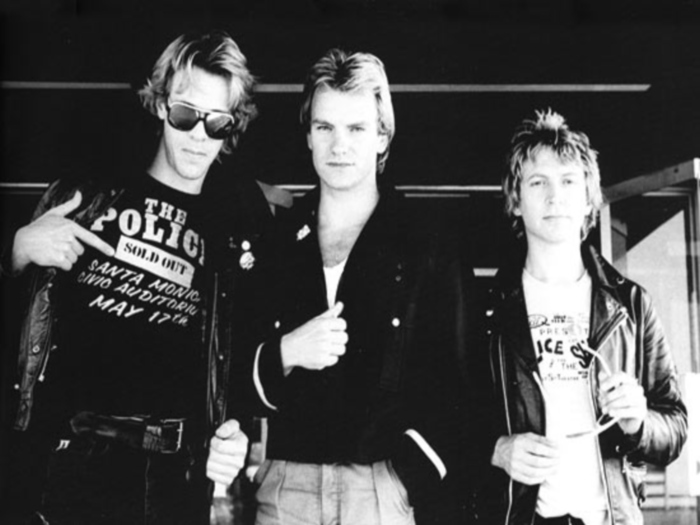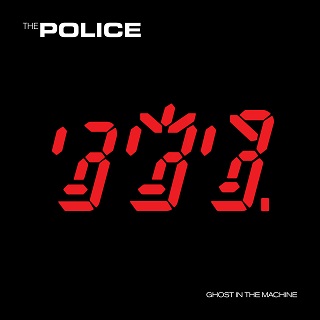THE POLICE
The Police were an English rock band formed in London in 1977. For the vast majority of their history, the band consisted of Sting (lead vocals, bass), Andy Summers (guitars) and Stewart Copeland (drums). The Police became globally popular in the late 1970s and are generally regarded as one of the first New Wave groups to achieve mainstream success, playing a style of rock that was influenced by punk, reggae, and jazz. Their 1983 album, Synchronicity, was number one on both the UK Albums Chart and the US Billboard 200, and sold over 8,000,000 copies in the US. The group disbanded in 1986, but reunited in early 2007 for a one-off world tour lasting until August 2008. The Police have sold more than 50 million albums worldwide, and were the world's highest-earning musicians in 2008, thanks to their reunion tour.
The Police were founded by American expatriate Stewart Copeland in early 1977. After the demise of his progressive rock band Curved Air, Copeland was eager to form a new three-piece group and join the burgeoning London punk scene. Singer-bassist Sting (Gordon Sumner) and guitarist Henry Padovani began rehearsing with Copeland in January 1977, and they recorded the first Police single "Fall Out" the following month.
The bleached-blond hair that would become a trademark of the band was a lucky accident. In February 1978, the band, desperate for money, was asked to do a commercial for Wrigley's Spearmint chewing gum on the condition that they dye their hair blond. Although the commercial was shot with the band, it was shelved and never aired.
Although the early style of the group has been classified as punk rock, Allmusic Guide argues that this was only true "... in the loosest sense of the term"; the Guide states that the band's "... nervous, reggae-injected pop/rock was punky" and had a "punk spirit", but it "wasn't necessarily punk".
Prior to his days in the Police, Sting had spent time as a secondary school English and Mathematics teacher, and his work with the band reflects a literary awareness. For example, material on the album Ghost in the Machine was inspired by the writings of Arthur Koestler, and the Police's final studio album Synchronicity was influenced by the writings of Carl Jung. Sting also peppers his songs with literary allusions: the song "Don't Stand So Close to Me" mentions Vladimir Nabokov's novel Lolita; the song "Tea in the Sahara" alludes to the novel The Sheltering Sky by Paul Bowles; and the song "Wrapped Around Your Finger" refers both to the sea monsters Scylla and Charybdis, from Greek mythology, and to Mephistopheles, from the German legend of Faust.
Band members:
- Sting: lead vocals, bass guitar, backing vocals, keyboards, saxes (studio only) (1977–1984, 1986, 2007–2008)
- Andy Summers: guitars, backing vocals (live only), keyboards (1977–1984, 1986, 2007–2008)
- Stewart Copeland: drums, percussion, backing vocals (live only), keyboards (1977–1984, 1986, 2007–2008)
- Henry Padovani: guitar (1977)
Discography:
OUTLANDOS D'AMOUR
(1978)
Outlandos d'Amour is the debut album by The Police, released in 1978.
The album, while at times incorporating reggae, pop, and other elements of what would eventually become the definitive sound of the band, is dominated by punk influences. It starts off with "Next To You", a punk number with a slide guitar solo in the middle. The reggae-tinged "So Lonely" follows. "Roxanne", about a prostitute, was written by Sting after visiting a red-light district in Paris and is one of The Police's best-known songs. It is followed by "Hole in My Life", another reggae-tinged song, and "Peanuts", a Sting–Stewart Copeland collaboration which blends punk aggression with a decidedly humorous tone. "Can't Stand Losing You" and the high-tempo "Truth Hits Everybody" begin side two of the original LP. "Be My Girl—Sally" is a medley of a half-finished song by Sting and an Andy Summers poem about a blowup doll. This leads into the semi-instrumental closer, "Masoko Tanga", the only song on the album to not become a staple of the Police's live performances.
Two other songs from these sessions were released as b-sides: "Dead End Job" credited to the entire band on the flip of "Can't Stand Losing You," and "No Time This Time" by Sting on the back of "So Lonely," later issued on Reggatta de Blanc.
Punk band No Use for a Name covered the song "Truth Hits Everybody" (with modified lyrics) on their 1990 debut album, Incognito. The pop-punk band Motion City Soundtrack also covered the same song for a Police covers album. "Next to You" was later packaged in Rock Band. "Truth Hits Everybody", "Roxanne", "Can't Stand Losing You", and "So Lonely" were all released as downloadable content for the Rock Band series.
REGGATTA DE BLANC
(1979)
Reggatta de Blanc is the second album by The Police, released in 1979. It features the band's first two number 1 hits, "Message in a Bottle" and "Walking on the Moon".
The instrumental "Reggatta de Blanc", one of the few songs written by the Police as a group, came from the long instrumental break in the live performance of "Can't Stand Losing You" and earned the band the 1980 Grammy Award for Best Rock Instrumental Performance. "Bring on the Night" is about the execution of Gary Gilmore - though purely by accident. Under its original title of "Carrion Prince", the song was about Pontius Pilate. After adapting it into "Bring on the Night" for Regatta de Blanc, Sting read The Executioner's Song and was shocked that the intentionally abstract lyrics he'd written fit exactly with Gilmore's life story. He claims that since then, "I sing it with him in mind." "The Bed's Too Big Without You" was covered by reggae singer Sheila Hylton in 1981, which became a UK Top 40 hit.
The album continued to build on the success of the band's previous record, hitting #1 on the UK and Australian album charts upon its release in October 1979. "Message in a Bottle" and "Walking on the Moon" were released as singles and both reached #1 in the UK. In 2003, the album was ranked number 369 on Rolling Stone magazine's list of the 500 greatest albums of all time.
ZENYATTÀ MONDATTA
(1980)
Zenyattà Mondatta is the third album by The Police, released in 1980.
Zenyattà Mondatta went to #5 in the U.S. and #1 in the UK and Australia, spurred by the success of the Sting-penned singles "Don't Stand So Close to Me" and "De Do Do Do, De Da Da Da". It would later receive glowing reviews from re-assessments in Rolling Stone and Q Magazine, among others, but was the least well-received of the five albums by The Police, and the only one not to obtain a spot on Rolling Stone's list of the 500 greatest albums of all time.
GHOST IN THE MACHINE
(1981)
Ghost in the Machine is the fourth album by The Police, released in 1981 (see 1981 in music). Much of the material in this album was inspired by Arthur Koestler's The Ghost in the Machine, which also provided the title. It was their first album to bear an English language title. The group released three successful singles from the album: "Every Little Thing She Does Is Magic", "Invisible Sun", and "Spirits in the Material World". It went multi-platinum in the United States. The album was listed #322 on Rolling Stone's 500 Greatest Albums of All Time.
"Invisible Sun," released as a single instead, was a large success in the UK, making it to #2 even though the video was banned by the BBC for including footage of the conflict in Northern Ireland. Later, "Every Little Thing She Does is Magic" made it to #3 in the U.S. and #1 in Britain, and "Spirits in the Material World" made it to the U.K. Top 20.
In 2000 Q magazine placed Ghost in the Machine at #76 in its list of the 100 Greatest British Albums Ever. In 2003, the album was ranked #322 on Rolling Stone magazine's list of the 500 greatest albums of all time, the band's highest ranking on the list. Pitchfork Media ranked it #86 in their list of the 100 Greatest Albums of the 1980s.
SYNCHRONICITY
(1983)
Synchronicity is the fifth and final studio album by The Police, released in 1983. The band's most popular release, Synchronicity includes the hit songs "Every Breath You Take", "King of Pain", "Wrapped Around Your Finger", and "Synchronicity II".
Synchronicity topped the album charts in both the UK and USA (interrupting the dominance of Michael Jackson's Thriller in the US). It won a Grammy Award for Best Rock Performance by a Duo or Group with Vocal.
In 2001, the TV network VH1 named Synchronicity the 50th greatest album of all time. In 2003, the album was ranked number 455 on Rolling Stone magazine's list of the 500 greatest albums of all time. Pitchfork Media ranked it #55 in their list of The 100 Greatest Albums of the 1980s. In 2006, Q magazine placed the album at #25 in its list of "40 Best Albums of the '80s".
And now enjoy some quality music from The Police:







No comments:
Post a Comment